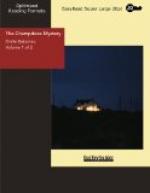Norbert, however, was too agitated to listen to the idle gossip of Montlouis any longer, so he pressed his hand and left him rather abruptly, walking away at the top of his speed, leaving his friend silent with astonishment. It seemed to Norbert as if he was imprisoned in one of those iron dungeons he had read of, which slowly contracted day by day, and at last crushed their victims to atoms. He saw Diana married to the Viscount de Mussidan, and compelled to meet daily the man who knew all about her illicit meetings with her former lover, and who had more than once, when Norbert was unable to leave Champdoce, been intrusted with a letter or a message for her. And how would Montlouis behave under the circumstances? Would he possess the necessary tact and coolness to carry him through so difficult a position? What would be the end of this cruel concatenation of circumstances? Would Diana be able to endure the compromising witness of her youthful error? She would eagerly seek out some pretext for his dismissal; he could easily detect this, and in his anger at the loss of a position which he had long desired, would turn on her and repeat the whole story. Should Montlouis let loose his tongue, the Viscount, indignant at the imposition that had been practised upon him, would separate from his wife. What would be Diana’s conduct when she found herself left thus alone, and despised by the society of which she had hoped to be a queen? Would she not, in her turn, seek to revenge herself on Norbert? He had just asked himself whether at this juncture death would not be a blessing to him, when he caught sight of Francoise, the daughter of the Widow Rouleau, close by him. For two hours she had been awaiting his coming, concealed behind a hedge.
“I have something to give you, my lord Marquis,” said she.
He took the letter that she held out to him, and, opening it, he read,—
“You said that I did not love you—perhaps this was but a test to prove my love. I am ready to fly with you to-night. I shall lose all, but it will be for your sake. Reflect, Norbert; there is yet time, but to-morrow it will be too late.”
These were the words that Mademoiselle de Laurebourg had had the courage to pen, which to the former lover were full of the most thrilling eloquence. The usually bold, firm writing of Diana was, in the letter before him, confused and almost illegible, showing the writer’s frame of mind. There were blurs and blisters upon the paper as though tears had fallen upon it, perhaps because the writing had been made purposely irregular and drops of water are an excellent substitute for tears.
“Does she really love me?” murmured he.
He hesitated; yes, he absolutely hesitated, impressed by the idea that for him she was ready to sacrifice position and honor, that he had but to raise his finger and she was his, and that in the space of a couple of hours she might be the companion of his flight to some far-distant land. His pulse throbbed madly, and he could scarcely draw his breath, when some fifty paces down the road he caught sight of the figure of a man; it was his father. This was the second time that the Duke by his mere presence had spread the web of Diana’s temptations and allurements.




